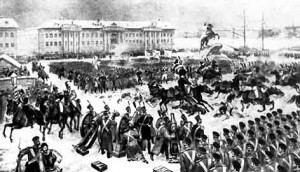On December 14, 1825, the Decembrists stood tall in front of the government calling for revision in administration as well as a rule on behalf of the people. Quickly such a revolt was ended in bloodshed by the government, but the ideas behind the revolt left quite the impression for years to follow.
The Decembrists, called such because of the time of the revolt, were comprised of three secret societies. The Northern Society were young members of the educated elite who were dissatisfied with current conditions in Russia not only for the noblemen but also for the population as a whole. The Southern Society on the other hand had members who were former officers of the Smenovskii Regiment located in Ukraine. The last secret society involved in the Decembrist efforts was the Society of United Slavs who can be categorized as the proletariat of the Russian nobility, living alongside mostly Polish nobility. “It was not so much their common social class, nor their closeness in age that makes them a definable group. It is rather their sharing of the same historical experiences, mainly the Napoleonic wars,” (24). This revolting group was angered at what was going on around Europe but not in Russia. Fighting intensely and bravely for the county, Russian citizens were not rewarded for their efforts. While countries such as Poland (actually under Russian control) and France adopted constitutions, Russians felt that after helping defeat Napoleon, they deserved guaranteed rights as well. Much of the Decembrists focus was not to dismantle the Russian government, but to reorganize it. They found much of the autocratic rule corrupt, especially with the succession of Nicholas, and therefore wanted a government more focused on serving the people. They were fighting against the split between state and society; a bridging of “we” and “they.”
The government killed off the main leaders in the revolt, but let the rest of the Decembrists live on. “By allowing them to live on, making it possible for them to write their memoirs and to be an example of heroic sacrifice for another generation or two, he transformed their failure into victory,” (27). Ideas of enlightenment and romanticism were able to live on even though the leaders of the revolt did not. This was a group of educated, young, and passionate Russians that even though selfish for some purposes, looked at Russia as a whole and saw how in many ways it was backwards and poor. Such a powerful patriotic energy would remain lively for years to come.
https://russianculture.wordpress.com/2010/11/07/the-decembrist-uprising/
Questions:
- How can a revolt be seen as patriotic? In what ways were the Decembrists embody Russian ideals and adapt more of a reformist platform rather than revolutionary?
- How aware do you think Nicholas as well as other rulers were aware of the power of the ideas of the Decembrists?
Works Cited:
Raeff, Marc. “The Decembrists.” in Russian Civilizations Series. NJ: Englewood Cliffs: 1-29.

